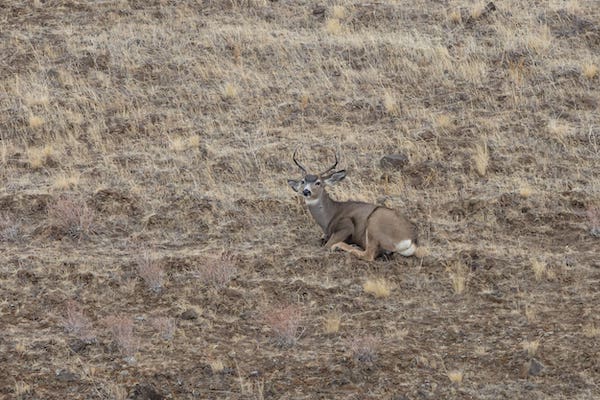
US House Passes CWD Management, Research Act
As chronic wasting disease edges perilously close to Washington and Oregon this fall with the discovery of it in two west-central Idaho bucks, the US House of Representatives yesterday passed a bipartisan bill that would help fund the fight against the always-fatal deer family disease.

What’s known as the CWD Research and Management Act, or H.R. 5608, would provide $70 million annually through 2028 to federal, state and tribal agencies for research and management of the spreading disease, and now backers are looking for the US Senate to introduce a companion bill.
“This swift bipartisan passage of the Chronic Wasting Disease Research and Management Act reflects the incredible need for resources to study and stop the spread of the disease on behalf of our wild deer herds and hunting opportunities,” said Whit Fosburgh, president and CEO of the Theodore Roosevelt Conservation Partnership in a press release. “This legislation has the federal government stepping up its responsibility for addressing CWD, giving state agency staff more support, focusing the scope of much-needed research, and educating the full spectrum of stakeholders – from hunters to the captive cervid industry – so that we are all accountable for advancing CWD solutions.”
“CWD is one of the biggest threats to deer, elk and other wild cervids in the United States, and with no known cure it continues to spread,” said John Gale, Backcountry Hunters and Anglers conservation director, also in a press release. “Combatting the spread of CWD and ensuring that future generations can enjoy healthy wildlife populations and quality hunting opportunities is critical to our great American outdoor traditions.”
Boone and Crockett Club President James F. Arnold thanked prime sponsors, Representatives Ron Kind (D-Wisconsin) and GT Thompson (R-Pennsylvania), for introducing the bill and looked for Congress’s upper chamber to take up the issue soon.
“We hope the Senate will act quickly so states can become even more proactive in addressing chronic wasting disease,” Arnold stated.
The bill passed on a 393-33 vote, with the entire Northwest delegation of representatives, Democrats and Republicans, voting in favor. Idaho Rep. Mike Simpson, a Republican, and Oregon Reps. Earl Blumenauer and Suzanne Bonamici, both Democrats, have also signed on as cosponsors.
Per TRCP, elements include $35 million annually for research that would focus on:
- Methods to effectively detect CWD in live and harvested deer and the surrounding environment
- Best practices for reducing CWD occurrence through sustainable harvest of deer and other cervids
- Factors contributing to spread of the disease locally, such as animal movement and scavenging
And the organization says the other half of the $70 million disbursement would help support state and tribal surveillance, testing and management, with special prioritization for:
- Areas with the highest incidence of CWD
- Areas responding to new outbreaks of CWD
- Areas without CWD that show the greatest risk of CWD emerging
- Jurisdictions demonstrating the greatest financial commitment to managing, monitoring, surveying, and researching CWD
- Efforts to develop comprehensive policies and programs focused on CWD management
In response to the detection of chronic wasting disease in two mule deer bucks harvested by hunters within a quarter mile of each other between Riggins and Grangeville in October, Idaho wildlife officials authorized an emergency hunt in the area that began earlier this week with the purpose of collecting 775 samples from the area for further testing.
As of 10 a.m. Mountain Standard Time today, 24 whitetail and mule deer have been taken for testing, an IDFG hunt tracker shows.
To the west, ODFW announced it was ramping up the state’s ongoing testing, particularly in Northeast Oregon, which is just across Hells Canyon and a few ridges from where IDFG’s surveillance and detection hunts are occurring. Next hunting season will also see mandatory stops at game checks.
And in Washington, WDFW’s Staci Lehman says some 300-plus samples collected at an expanded network of check stations during October’s and November’s general rifle hunts north and northwest of Spokane, as well as from roadkilled deer, have all been negative for CWD.
That effort guards the state against an outbreak in whitetail deer near Libby, Montana, 70 miles from Newport, but with the discovery of CWD in Idaho, WDFW will add monitoring efforts in Southeast Washington as well as Ferry County, Lehman said.
And she indicated that opportunistic testing is continuing with roadkills and animals removed due to human-wildlife conflict issues.
